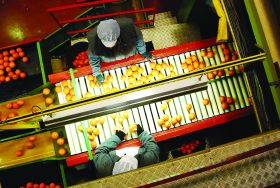Cooperative
Retailer completes sale of former logistics hub after moving operations to M1 site in 18-month major logistics overhaul.
The Co-operative Estates has completed the sale of its former East Midlands regional distribution centre (RDC) to a logistics company.

The RDC, at Blenheim Industrial Estate, Nottingham, has been sold to logistics firm Great Bear Distribution, which plans to use it for storage and distribution.
The 208,000 sq ft warehouse was closed as part of The Co-operative’s restructuring of its national distribution network. Operations have been consolidated into a new 500,000 sq ft RDC at Castlewood, at junction 28 on the M1.
The sale included an adjacent vehicle maintenance unit of 7,600 sq ft, with both the areas covering around nine acres.
“The lack of speculative development in recent years now means that demand for large industrial units outweighs supply which has aided the sale,” said Geoff Player, director of commercial and investment property with The Co-operative Estates.
Player said it is the company’s tenth major industrial property transaction since it began restructuring its UK warehouses 18 months ago.
David Willmer, senior director at GVA, who acted on behalf of The Co-operative Estates, said: “The quality of the unit, together with its excellent accessibility to the motorway network, ensured that strong interest was received from both potential occupiers and investors.”
Results of a survey by Ethical Consumer readers come after scandal surrounding Paul Flowers, group’s ex-chairman
The Co-operative Group has been voted the most ethical company in the UK over the last 25 years.

The results of a survey by the readers of the Ethical Consumer magazine come shortly after a scandal surrounding Paul Flowers, the group’s former chairman, who pleaded guilty to the charge of possessing cocaine in May.
It also revealed losses of £2.5 billion for the financial year ending April 2014
Ethical Consumer co-director Tim Hunt, said: “Many commentators have had their knives out for The Co-op Group in recent months. Ethical Consumer’s readers, however, are able to see through the spin and realise that despite the problems, The Co-op remains an ethical business at heart – at least for the time being.”
In order to generate capital, The Co-op Group has sold its farm business to the Welcome Trust for £249 millions.
Peter Pereira Gray, managing director of investments at the Wellcome Trust, said: “The Co-operative has its own form of ethics. We wouldn’t necessarily seek to be exactly replicating theirs. We have our own very high standards.”
Sector saw turnover rise and created more jobs last year in spite of economic downturn

Spain’s agrifood cooperatives have weathered one of the most challenging economic periods in the country’s history, posting an 8% increase in turnover in 2013. According to data from the Observatory of Agrifood Cooperatives (OSCAE) presented during the general assembly of Cooperativas Agro-alimentarias (Spanish Agrifood Cooperatives) turnover rose from €23.82bn to €25.69bn in the past year.
The cooperative grouping, which represents Spain’s 3,844 cooperatives working in the agrifood sector, cited stronger prices across some of the country’s main agricultural products, including fruits and vegetables, olive oil, olives and wines, as the main reason for the improved results.
The data shows that the cooperative sector increased its presence on international markets and now account for 27% of Spain’s total export turnover in the food industry.
The number of workers employed by its members went over by 8.25% in the five years between 2007 and 2012, proving the important role the sector plays in job creation and growth, the group said.
Cooperativas Agro-alimentarias held its general assembly in Madrid last week, during which Angel Villafranca was elected as the group’s new president. Villafranca, who also heads up the Agrifood Cooperatives of Castilla-La Mancha, replaces Fernando Marcén, former president of the Agrifood Cooperatives of Aragon.
Villafranca said the new presidency would continue “with the policy of effort and integration of our food companies, carried out by Fernando Marcén with unmistakable success and by organisational expertise of the entire professional team.”
Among the objectives set out by the new presidency, Villafranca said the focus would be on further consolidation and integration in the coming years. He said Spain’s agricultural production outside the cooperatives could not continue in their present disorganised and atomised state, and called for “an urgent restructuring process that allows us to minimise the effects of increasing external competition and highly concentrated customers, maximising the benefits from the internationalisation process, particularly in emerging markets”.